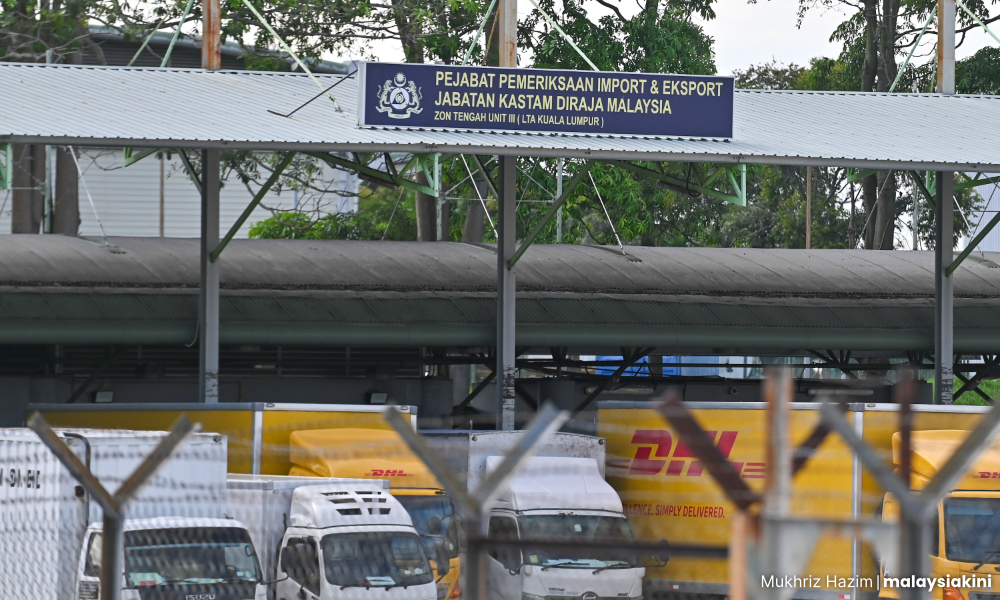


How far can govt creep into your bedsheets?
Yiswaree Palansamy
Published: Aug 30, 2025 9:32 AM
Updated: 1:31 PM
The government’s latest crackdown on private sexual behaviour has raised an important question.
Just how far can the state penetrate the private sex lives of its citizens?
Some sexual acts and same-gender relations are unambiguously criminalised. But where does that leave partner swapping, or even individual acts of self-pleasure?
On Aug 19, Home Minister Saifuddin Nasution Ismail revealed in the Dewan Rakyat that police had raided a luxury condominium in Kuala Lumpur after detecting a website promoting swinger activities.
Students, civil servants, and foreign nationals were among those detained, although Saifuddin stopped short of explaining whether they were Muslims, non-Muslims, or a combination of both.
He said investigations were opened under various provisions of the Penal Code, including those covering prostitution, unnatural intercourse, and obscene acts.
Published: Aug 30, 2025 9:32 AM
Updated: 1:31 PM
The government’s latest crackdown on private sexual behaviour has raised an important question.
Just how far can the state penetrate the private sex lives of its citizens?
Some sexual acts and same-gender relations are unambiguously criminalised. But where does that leave partner swapping, or even individual acts of self-pleasure?
On Aug 19, Home Minister Saifuddin Nasution Ismail revealed in the Dewan Rakyat that police had raided a luxury condominium in Kuala Lumpur after detecting a website promoting swinger activities.
Students, civil servants, and foreign nationals were among those detained, although Saifuddin stopped short of explaining whether they were Muslims, non-Muslims, or a combination of both.
He said investigations were opened under various provisions of the Penal Code, including those covering prostitution, unnatural intercourse, and obscene acts.

Home Minister Saifuddin Nasution Ismail
Section 233(1)(a) of the Communications and Multimedia Act and the Film Censorship Act were also invoked, alongside state-level syariah enactments.
The grey zone
Despite this, legal experts told Malaysiakini that consensual swinging remains a grey area, vulnerable to selective interpretation and enforcement.
“There is no specific law that explicitly criminalises consensual partner swapping or swinging,” explains senior lawyer Nizam Bashir, noting the absence of such terminology in legislation despite the country’s conservative stance on sexual matters.
Senior lawyer Latheefa Koya echoed this assessment, emphasising that partner-swapping arrangements are private and generally fall outside the scope of criminal prosecution.
“There is no explicit criminalisation,” Latheefa stated, noting that the legislation contains no specific provisions targeting consensual swinging activities between married adults.
Implicit criminalisation
However, the reality is more complex. While civil law does not expressly outlaw swinging, Nizam said activities may still fall foul of the law in indirect ways.
Section 233(1)(a) of the Communications and Multimedia Act and the Film Censorship Act were also invoked, alongside state-level syariah enactments.
The grey zone
Despite this, legal experts told Malaysiakini that consensual swinging remains a grey area, vulnerable to selective interpretation and enforcement.
“There is no specific law that explicitly criminalises consensual partner swapping or swinging,” explains senior lawyer Nizam Bashir, noting the absence of such terminology in legislation despite the country’s conservative stance on sexual matters.
Senior lawyer Latheefa Koya echoed this assessment, emphasising that partner-swapping arrangements are private and generally fall outside the scope of criminal prosecution.
“There is no explicit criminalisation,” Latheefa stated, noting that the legislation contains no specific provisions targeting consensual swinging activities between married adults.
Implicit criminalisation
However, the reality is more complex. While civil law does not expressly outlaw swinging, Nizam said activities may still fall foul of the law in indirect ways.

Here, civil provisions often intersect with syariah offences, which apply exclusively to Muslims under the Syariah Criminal Offences Act.
These include:
- Sexual intercourse out of wedlock (Section 23)
- Acts preparatory to sexual intercourse out of wedlock (Section 24)
- Sodomy (Section 25)
- Musahaqah or lesbian acts (Section 26)
- Khalwat, or close proximity (Section 27)
- Indecent acts in public (Section 29)
“To the best of my recollection, there are no high-profile cases specifically about consensual extramarital activities, although the issue arose, somewhat tangentially, in the case of a Dutch model who fell to her death,” Nizam noted.
He added that prosecutions typically involve prostitution, adultery in divorce proceedings, or the production and distribution of obscene material.
“So in that sense, the recent case cited by the home minister may become a leading precedent for how the courts treat organised swinging activities under prostitution and obscenity laws,” Nizam said.
Latheefa agreed that consensual extramarital activities have rarely been tested in civil courts.
Organised vs private
Legal opinions, however, diverged on whether organised swinging events should be treated differently from private encounters.
“Yes, organised events move the activity from a potentially private act to a public or quasi-public one. They can be framed as a disorderly house or a house used for immoral purposes, or an assembly that breaches public peace and morality,” Nizam said.
Family law expert Shanker Sundaram agreed that publicity increases the likelihood of prosecution, pointing to Penal Code provisions on obscene objects and public indecency.
“For Muslims, participation would almost certainly fall under syariah morality offences regardless of publicity,” he added.

Latheefa, however, rejected this view: “No, it’s a private matter,” she stated, suggesting that consensual activities conducted privately would not fall under public morality laws.
Court rulings have also reshaped the legal terrain. Latheefa pointed to the Federal Court’s decision in PP v Lai Hen Beng, which struck down laws on “enticement” of married women.
“No, because it’s consensual. In any case, enticement is already struck down,” she said, noting that this once-common avenue for prosecution has disappeared.
Civil and syariah laws
The duality of Malaysia’s legal system adds another layer of uncertainty.
“Soliciting for prostitution is a criminal offence under the Penal Code - this is a federal law - both Muslims and non-Muslims can be charged and punished under Section 372B,” lawyer Kee Hui Yee said.
Shanker provided a broader context.
“In syariah courts, however, adultery (zina) remains a serious offence, and cases of consensual extramarital sex can attract prosecution. Overall, precedents mostly treat such behaviour as a factor influencing divorce outcomes rather than a standalone civil wrong.
“There are few clear precedents in courts on consensual extramarital activities like swinging. Adultery itself is not a crime under civil law, but it is often raised in divorce cases as evidence of unreasonable behaviour or marital breakdown.
“Courts have considered adultery when deciding on divorce, maintenance, and custody, even without criminal sanctions,” Shanker explained.
Kee cited a 2024 divorce case, anonymised as HCL v PTL & Anor, where a couple had agreed that the husband could keep a mistress. The court upheld the clause, though Kee noted that issues of morality or public policy were not examined as part of the ruling.

In family law, adultery is not itself a factor in dividing matrimonial property, but can influence rulings on maintenance or damages.
“So it is open for arguments, whether partner swapping caused the breakdown of the marriage. On the other hand, it can be argued that it was consensual, so it was not the cause,” Kee added.
Sex toys: Clearly criminal
While swinging sits in a legal grey zone, sex toys are treated with unambiguous severity.
Classified as “obscene articles”, their importation without a permit is banned under the Customs (Prohibition of Imports) Order 2017.
“In practice, this means bringing in sex toys from abroad - even for personal use - is legally barred. If detected at customs, the items are subject to confiscation, and the individual may be investigated under the Penal Code or Customs Act,” Shanker explained.

He added that while personal use usually ends with confiscation, commercial activity is treated as a crime, with enforcement hinging on the quantity of items and evidence of intent to sell.
“Although the law does not formally distinguish between the two, enforcement practice does,” Shanker added.
Nizam noted that prosecutions may rely on the Penal Code, Customs Act, or even the Printing Presses and Publications Act (PPPA) 1984.
“Also, no statutory defence exists. A litigant could attempt to argue necessity, in a medical sense, as a defence to a possession charge. Such a case would be novel in nature,” he said.
Penalties can be severe - up to three years’ imprisonment, a fine, or both under Section 292 of the Penal Code - with customs law allowing fines of up to 20 times the value of seized goods.
“Conservative viewpoints, whether religiously grounded or culturally grounded, most certainly drive the enforcement of these laws.
“Even so, one may properly ask whether there should be a blanket ban on adult toy use specifically where that adult toy use is supported on medical grounds,” Nizam said.
There could be charges under Shariah if the participants were Muslims, as sexual relations between partners who are not legally married is a Shariah offence.
ReplyDeleteAs I understand it, there is no room for criminal charges for heterosexual swinger activities between consensual adults , non-Muslim, and no commercial activities involved e.g.prostitution, or the website charged for services..
Public disturbance ? Not if it was private property and nobody was being disturbed.
Knowing the idiotic mentality of Saifuddin Nasution , he will instruct them to be charged , by hook or by crook.
If the case gets thrown out in court, he doesn't care.
Look at how they insisted to penalise Swatch and seized the Rainbow watches. Swatch chose to exit the Malaysian market -loss for Malaysia business and employees - the case ultimately got thrown out of court and the seized watches ordered returned - because at the time of seizure, no relevant Malaysia Government Gazzette existed. No offence exists before the Government officially publishes that there is such an offence - get it ?
Saufudddin Nasution is an idiotic authoritarian thug with no respect for Rule of Law.